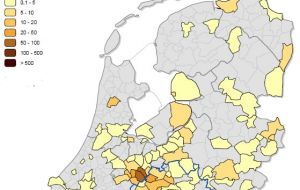MercoPress. South Atlantic News Agency
Outbreak of Q-fever in Netherlands forces massive culling of goats and sheep
 The disease is prevalent in large scale goat farms in southern Holland
The disease is prevalent in large scale goat farms in southern Holland An estimated 15 to 20,000 goats and sheep in the Netherlands are to be slaughtered in connection with Q-fever. Dutch Ministers of Health Ab Klink and Agriculture Gerda Verburg have agreed that on infected farms where animals have not been vaccinated, all pregnant animals must be slaughtered, whether or not they have the virus.
Highly infectious Q-fever is caused by bacteria (Coxiella burnetii) released when pregnant goats or sheep have spontaneous abortions. The disease is prevalent in areas in the southern Netherlands with large-scale goat farms and a relatively dense population.
This year alone 2.200 people have contracted the disease in the Netherlands with at least six deaths reported.
On farms that have vaccinated animals, all animals would be tested for Q fever and those contaminated will be culled, Dutch Agriculture Minister Gerda Verburg said. On farms that have not carried out vaccinations, pregnant animals will be culled in addition to contaminated animals, Verburg added.
“The measures we have taken so far have helped, such as the obligation to vaccinate in some areas. Therefore we can expect a strong decline of cases with humans in 2011. But we also want to do the maximum to limit the consequences next year,” she said.
The measure affects 55 farms in the Netherlands, but Verburg declined to estimate how many sheep and goats would be killed. There were 1.2 million sheep and 355,000 goats in the Netherlands last year.
Q fever is usually not visible with contaminated goats and sheep, but they can lead to premature or still births.
Dutch authorities had already taken measures to prevent spreading of Q fever, such as vaccinations programmes for farms holding more than 50 sheep or goats, and restrictions on transport to and from contaminated farms.




Top Comments
Disclaimer & comment rulesCommenting for this story is now closed.
If you have a Facebook account, become a fan and comment on our Facebook Page!